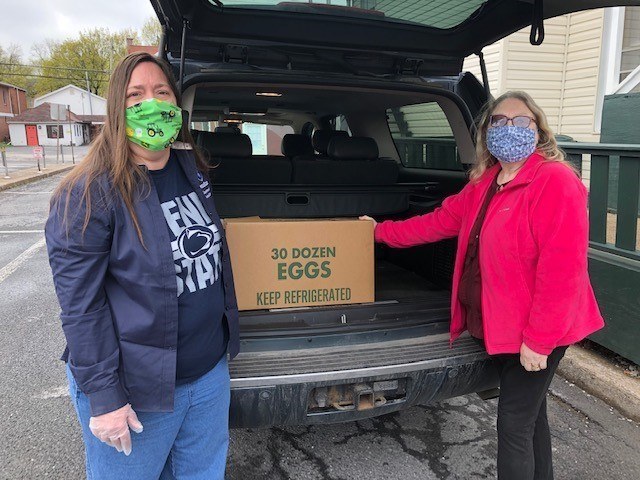Posted: May 8, 2020
Penn State Meats Laboratory, the Penn State Poultry Education and Research Center and the Penn State Berkey Creamery have donated food products to food banks throughout the region.

Paula Morgan, administrative support coordinator for the Department of Animal Science, left, recently delivered a case of eggs to Robin Knepp of the Central Pennsylvania Community Action Food Bank in Philipsburg. Image: Amy Duke
By Amy Duke
UNIVERSITY PARK, Pa. - With thousands of people out of work due to the COVID-19 crisis - and food banks working tirelessly to feed an ever-growing number of hungry families - Penn State's College of Agricultural Sciences is doing its part to fill empty shelves and refrigerators.
In the past several weeks, three of the college's units - the Penn State Meats Laboratory, the Penn State Poultry Education and Research Center and the Penn State Berkey Creamery - have donated food products valued at more than $25,000 to food banks throughout the region.
These donations are an extension of the University's land-grant mission to improve the lives of the citizens of Pennsylvania and beyond through agricultural teaching, research and extension, according to Steven Loerch, senior associate dean in the College of Agricultural Sciences.
"Our college has a primary mission of mitigating food insecurity and contributing to an environmentally sustainable, safe, abundant, nutritious and affordable food supply," he said. "Our farms are the laboratories for our teaching and discovery research programs. It's through these programs that we can help food banks as they support families in need."
Earlier this week, the Penn State Meats Laboratory, a USDA-inspected processing facility, delivered frozen bratwurst, pork sausage, pork and beef roasts, kielbasa, ground beef, and ham loaf to the State College Food Bank.
Glenn Myers, laboratory manager, said the donation of more than 500 pounds of meat in portion-sized packaging will provide 550 meals for families. The meat was produced from livestock reared at the Penn State cattle, sheep and swine farms, with laboratory staff involved in every stage - from harvest of the livestock to the packaging and marketing of the products.
The facility, under the Department of Animal Science, runs a weekly meat sale during the spring and fall semesters from its retail location on Porter Road; the facility is closed to the public temporarily due to the pandemic.
"Our staff and students normally engage and serve our community every Friday," said Jonathan Campbell, meat extension specialist and assistant professor of animal science. "Because we are not able to sell our products right now, we wanted to provide our remaining inventory to those who may be food insecure in our community."
Allayn Beck, executive director of the State College Food Bank, a nonprofit serving about 1,500 individuals in Centre County, said clients are grateful to have a variety of meat choices.
"Because we are having challenges with securing food at the time, having extra meat on hand is very helpful," she said. "Our food bank and our clients are thankful for the donation - Penn State is a wonderful community partner."
The Poultry Education and Research Center, also under the Department of Animal Science, typically houses between 1,200 and 1,500 laying hens for research and class purposes, according to Phillip Clauer, associate teaching professor of poultry science.
Each of these hens usually produces an egg each day. Eggs that are not used for research are sold to local customers through outlets such as the Penn State Meats Lab, the Berkey Creamery and private sales arranged by the facilities manager.
"Since we have a center that is biosecure, we cannot allow the public on the grounds; therefore, we do not have an on-site market," said Paul Patterson, professor and extension poultry specialist. "When our egg customers were not able to buy our product, we felt it was important to take care of the surrounding communities during this time of need."
Patterson, who organized the donations with Clauer and Nüket Acar, coordinator of undergraduate advising and instructor in veterinary and biomedical sciences, said cases of eggs are delivered weekly to the Central Pennsylvania Community Action Food Bank in Philipsburg, the Moshannon Valley YMCA Backpack Program, the State College Food Bank, the DuBois Food Pantry and the Faith Center Food Bank in Bellefonte. Combined, these programs serve thousands of families.
Robin Knepp, who oversees the Philipsburg food pantry, said the organization has received a rising number of requests for assistance, so the donation from Penn State "means a lot to the families we serve."
The Penn State Berkey Creamery, housed in the Department of Food Science, has been making weekly donations of dairy-related products to the Central Pennsylvania Food Bank, a nonprofit organization committed to reducing hunger in 27 counties, since mid-March when the creamery's retail store was closed to the public. To date, 20 pallets of products have been delivered.
"The coronavirus pandemic is having a devastating impact on many people, including those in our community," said Jim Brown, assistant manager of the creamery. "We wanted to do our part to ease their burden and give our products to families who need help now."
Joe Arthur, executive director of the food bank, said that with record numbers of Pennsylvanians filing for unemployment, the demand on food banks has increased significantly.
"We appreciate the safe and direct donation of food-service-quality food from Penn State, which will help us feed these families in need," Arthur said.
The Berkey Creamery, billed as the largest university creamery in the U.S., produces ice cream, cheese, milk, yogurt, sour cream, and a variety of other products, such as juices, lemonade and iced teas, made for sale and distribution to the University community.
Cows from Penn State's dairy herd provide most of the milk for the creamery's fresh dairy products, averaging about four days from cow to creamery treat.

